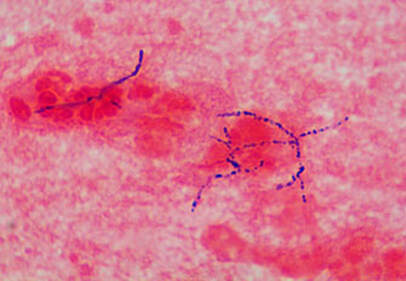PHILOSOPHY, GOALS, AND ORGANIZATION
 Nocardia showing characteristic beaded Gram positive filaments
Nocardia showing characteristic beaded Gram positive filaments
The goal of the program is to train fellows to assume leadership roles in academic and/or tertiary care clinical microbiology laboratories. Philosophically we believe that this education is best accomplished through hands-on instruction in microbiological methods, direct participation in the consultative and administrative activities of the microbiology laboratory, and participation in activities of the infectious diseases, pharmacy, and infection control/hospital epidemiology departments. The organization of the program reflects these goals.
Fellows will spend approximately 6 months (for example, 3 hours each morning) learning the bench techniques in the microbiology laboratory. In certain areas, such as molecular diagnostics, fellows will assist in the development, verification, validation, and institution of new methods, for example, migration of HSV diagnostics to a real time PCR platform, as opportunities arise. Afternoons will be spent integrating daily findings on microbiology rounds, selective participation in infectious disease rounds, participation in pharmacy and infection control meetings, and participation in laboratory administrative meetings including determination of scientific validity, economic viability, and clinical utility of introducing or maintaining methods in the laboratory.
A further philosophical belief is that fellows should be trained in the thought process involved in furthering the knowledge in our specialty. Fellows are expected therefore to organize and participate in discussion of clinical microbiology literature, to participate in clinical microbiology projects with potential and expectation for publication, and to attend a major meeting such as the American Society of Microbiology Microbe Meeting, ID week, the Clearwater Virology Meeting and BAARN.
Fellows are also expected to contribute to educational activities in the department, including teaching of pathology residents, microbiology technologists, and infectious disease fellows. For example, they will play a senior role in microbiology rounds where infectious disease fellows are taught in a weekly one hour session how we identify organisms of importance related to the infectious disease services. Fellows are also invited to participate in teaching of medical students during the microbiology courses at Harvard Medical School.
Fellows with Prior Relevant Training. The training schedule of fellows will be adjusted to reflect prior training in disciplines in and related to clinical microbiology. For example, for fellows who have spent a significant period of time during their pathology residency learning basic bacteriology, we will give focus in their fellowship training to areas to which they are less familiar, after ensuring competence in this particular area. Our goal is to challenge fellows and develop their skill set to the highest possible level during the fellowship training.
Fellows will spend approximately 6 months (for example, 3 hours each morning) learning the bench techniques in the microbiology laboratory. In certain areas, such as molecular diagnostics, fellows will assist in the development, verification, validation, and institution of new methods, for example, migration of HSV diagnostics to a real time PCR platform, as opportunities arise. Afternoons will be spent integrating daily findings on microbiology rounds, selective participation in infectious disease rounds, participation in pharmacy and infection control meetings, and participation in laboratory administrative meetings including determination of scientific validity, economic viability, and clinical utility of introducing or maintaining methods in the laboratory.
A further philosophical belief is that fellows should be trained in the thought process involved in furthering the knowledge in our specialty. Fellows are expected therefore to organize and participate in discussion of clinical microbiology literature, to participate in clinical microbiology projects with potential and expectation for publication, and to attend a major meeting such as the American Society of Microbiology Microbe Meeting, ID week, the Clearwater Virology Meeting and BAARN.
Fellows are also expected to contribute to educational activities in the department, including teaching of pathology residents, microbiology technologists, and infectious disease fellows. For example, they will play a senior role in microbiology rounds where infectious disease fellows are taught in a weekly one hour session how we identify organisms of importance related to the infectious disease services. Fellows are also invited to participate in teaching of medical students during the microbiology courses at Harvard Medical School.
Fellows with Prior Relevant Training. The training schedule of fellows will be adjusted to reflect prior training in disciplines in and related to clinical microbiology. For example, for fellows who have spent a significant period of time during their pathology residency learning basic bacteriology, we will give focus in their fellowship training to areas to which they are less familiar, after ensuring competence in this particular area. Our goal is to challenge fellows and develop their skill set to the highest possible level during the fellowship training.